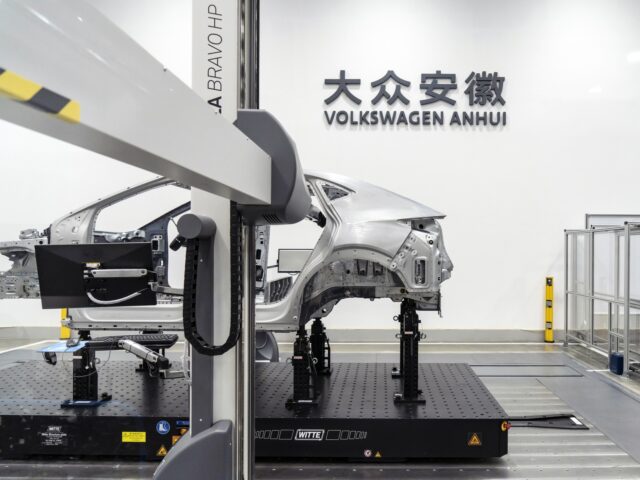The Volkswagen Group announced on Wednesday that it was ending operations in occupied East Turkistan, which the Chinese Communist Party administers and Xinjiang “province,” and selling off its facilities on the ground to a Chinese company.
The announcement came in the form of a press statement proclaiming deeper commitment to communist China and the company’s partnership with the state-owned car company SAIC, embedding deep in the greater text about growing operations in China that “alternative economic solutions” to reduce production of non-electric vehicles were in process, including the selling off of Volkswagen sites throughout East Turkistan.
Volkswagen’s operations in East Turkistan have for years elicited disgust and outrage from human rights activists. The occupied region is home to the indigenous Uyghur people as well as large communities of non-Han ethnic groups, such as the Kazakh and Kyrgyz people. Since at least 2017, the Chinese Communist Party has been implementing a genocide of those indigenous people through the establishment of concentration camps, a pervasive forced sterilization campaign, stealing children out of their family homes, live organ harvesting, and slavery. At their peak, the Uyghur concentration camps – which China referred to as Vocational and Educational Training Centers – imprisoned as many as 3 million people. Extensive evidence from Volkswagen operations in the region indicated that the company was benefitting from Uyghur slavery. Most recently, in February, an exposé revealed evidence that the Volkswagen-SAIC test track in Turpan, East Turkistan, was built by slaves.
Volkswagen will be reportedly selling sites in East Turkistan to an entity called Shanghai Motor Vehicle Inspection Certification (SMVIC). The sale includes facilities in the regional capital Urumqi as well as the controversial Turpan test track and another in Anting.
Volkswagen led its announcement with the news that it had extended the life of its joint venture with SAIC through 2040. It did not mention the human rights concerns surrounding operations in East Turkistan or the condemnation the company has faced for working there.
“Volkswagen and SAIC are pioneers of individual mobility in China,” Ralf Brandstätter, Volkswagen’s management board member for China, said. “Together, we established one of the first international joint ventures in the region 40 years ago. With this long-term contract extension, we underline the importance of this collaboration and the significance of the Chinese market for the Volkswagen Group.”
Volkswagen has been facing criticism for operating in East Turkistan for years. In 2019, the company insisted that its presence in Urumqi was “based purely on economics” and denied any ties to “forced labor.” The company’s China CEO Stephan Wollenstein insisted to the BBC in 2020 that any indication that Volkswagen was involved in slavery was inaccurate, responding to the company’s presence on a list of 82 corporations implicated in the landmark report Uyghurs for Sale, published by the Australian Strategic Policy Institute (ASPI).
“[W]e are making sure that none of our production sites have forced labor, and this is something that we specifically checked in Urumqi and I can assure you, we do not have forced labor,” he insisted.
“Forced labor” is one of several practices recognized by the United Nations as modern-day slavery. Others include debt bondage, forced marriage, and human trafficking.
Volkswagen’s repeat denials that it was not involved in slavery did not quell the outcry from human rights activists and concerns from investors. In 2022, Morgan Stanley Capital International issued a warning on environmental, social, and governance (ESG) grounds against the company, issuing a “red flag” for ESG violations on the grounds that it was tied to slavery in East Turkistan.
Brandstätter, who celebrated the SAIC partnership this week, conducted a personal inspection of the Urumqi plant in February 2023 which he claimed resulted in no findings indicating that any slaves were trapped working in the facility.
“We have no evidence of human rights violations at this plant – that has not changed after my visit,” he asserted. “I have no reason to doubt the information and my impressions. Regardless of that, of course, we continue to look.”
“Our partner has great interest in and is committed to ensuring a positive atmosphere and proper working conditions,” he added, referring to SAIC.
A year later, the German newspaper Handelsblatt, in coordination with acclaimed human rights researcher Adrian Zenz, published a bombshell report divulging extensive evidence that the test track in Turpan was built at least in part by slaves. The slavery was coordinated through a now-defunct state company called the “Xinjiang Test Track Project.”
“This entity not only employed transferred Uyghur laborers through so-called ‘poverty alleviation’ projects, but also actively participated in government work teams monitoring Uyghur families,” Zenz explained, “in arranging and hosting assimilatory ‘ethnic unity’ activities, exhorting Uyghur children to diligently study Chinese [Mandarin], and in facilitating the transfer of Uyghur surplus laborers to state-arranged workplaces.”
Zenz celebrated Volkswagen’s exit from East Turkistan on Wednesday, calling it “incredible news.”
“Volkswagen will fully divest from Xinjiang, sell both plant and test track. A huge victory for the Uyghur cause,” he wrote on social media. “This comes after our work exposed forced labor linked to the test track, and the faulty factory audit.”

COMMENTS
Please let us know if you're having issues with commenting.